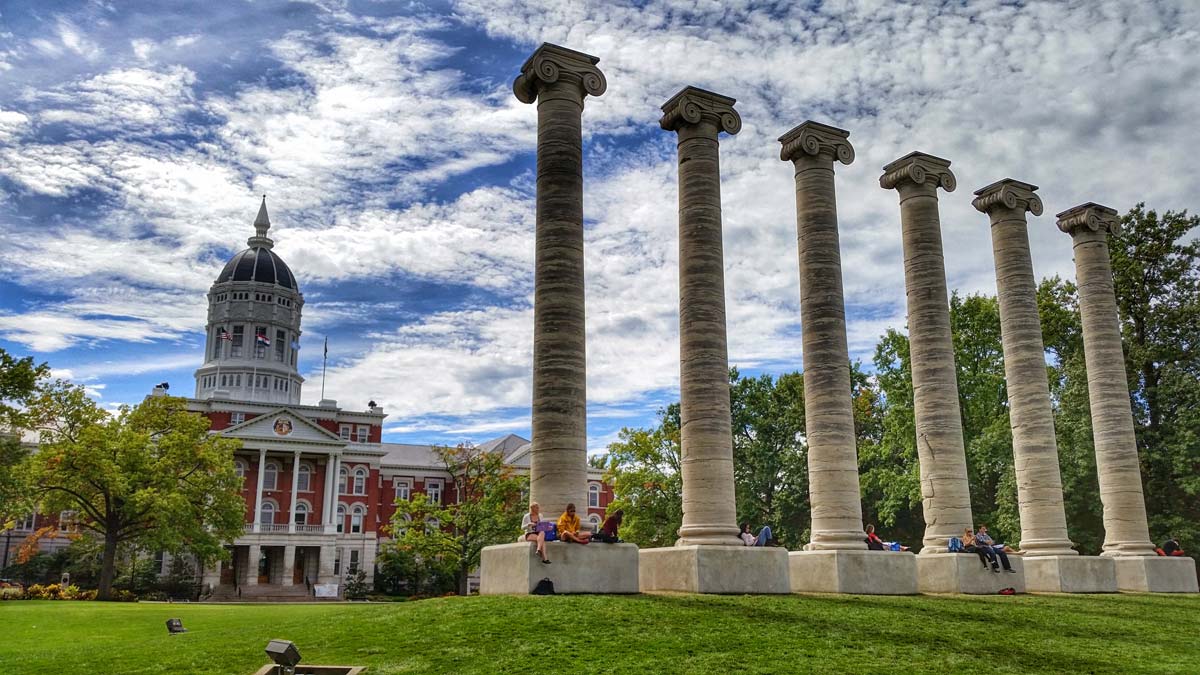This article is presented in partnership with MU Health Care.
For three years, Mike Conyers had an unusual nightly routine. He’d try to sleep until coughing and shortness of breath forced him out of bed. He would head to the living room, sit in his brown leather recliner with his dog, Tucker, at his side and turn on the television to watch “Diners, Drive-ins and Dives.” Sitting upright in the chair was the only way he could sleep.
“Because he couldn’t breathe, it was just like he was suffocating,” said Sherri, his wife of 40 years. “It was pretty rough.”
Conyers was diagnosed with allergies and prescribed medication, but the coughing continued.
“One medication needs another medication,” Conyers said. “And I was on a whole regimen of things that I didn’t need to be on.”
Conyers, 59, a lineman for the Missouri Public Utility Alliance, has been climbing poles to service power lines for 38 years. These days, he often travels to teach students training to become apprentice linemen in Missouri, Arkansas, Oklahoma and Nebraska.
“It was hard to fly on airplanes because I couldn’t breathe, hard to stay in hotels because I didn’t lay down,” Conyers said. “I was worried about being away from home and having something happen, being alone. I was always afraid of having a heart attack or something and dying out on the road by myself.”
He thought this would be his fate for the rest of his of life. Then he found hope at MU Health Care.
Finding a Solution
After shoulder surgery in 2018, Conyers’ leg swelled. When he visited MU Health Care’s Urgent Care, imaging tests revealed blood clots in his leg and lungs. He was referred to cardiologist Arun Kumar, MD.
“Mike was just not feeling well. He and his wife knew something was wrong and wanted some guidance, so we were able to get him in pretty quickly into clinic,” Kumar said. “We evaluated him thoroughly and found that he had severe heart blockages, or coronary disease.”
Kumar and heart surgeon Xingyi Que, MD, determined Conyers needed open-heart surgery.
Conyers was scared about surgery but relieved to finally have an answer. On June 4, 2019, he went in for his surgery. During the preparation, the anesthesiologist performed a transesophageal echocardiogram (TEE), a procedure in which doctors insert a device similar to a microphone down the esophagus to detect where waves bounce off of the heart structure, which was reviewed by Que before the surgery began. They discovered that Conyers had a leaking heart valve that allowed blood to flow backward into his heart. This was the answer to Conyers’ chronic coughing. It was an unexpected condition that was not found in the preoperative echocardiogram, but Que knew the procedure to fix it in addition to his coronary artery bypass graft — he just needed Sherri’s permission.
She was in the waiting room alone when she saw Que making his way toward her.
“I was scared to death at this point,” she said. “They had taken Mike, and he had been gone for probably an hour and a half. Dr. Que came out, and I asked him, ‘Did Mike die?’ That was my first question.”
Que explained the situation and noted that with the level of leakage in the heart valve, Conyers would need surgery to correct it. Rather than making him undergo separate surgeries, Que said he could fix everything at once with her permission.
Knowing her husband wouldn’t want more procedures, she agreed.
“If this were not caught, he might get into heart failure and some other coronary artery could shut down,” Que said. “He might have had a major heart attack that could have been life-threatening.”
Que and the surgical team performed bypasses that redirected blood around the blockages in two of Conyers’ arteries. Then they repaired the leaking heart valve.
The Recovery
After surgery, Mike spent seven days in the ICU so he could be monitored before being sent home. Encouraged by his newfound energy, he continued to further improve his health by managing his diet and walking two miles per day on a treadmill at the gym.
“I was able to see him in the hospital and watch him recover,” Kumar said. “Since that time, he’s felt much better, has more energy. He’s lost weight. He’s really taking good care of himself. It’s a real success story to be able to help someone like Mike.”
The second chance at life has inspired Conyers to do the things he loves most. He and Sherri enjoy spending time with their sons Josh and Justin — who coaches the Hallsville High School football team — and their wives and children. On the weekends, Mike and Sherri take his 1999 Jeep Wrangler for drives along the Missouri River near Cooper’s Landing with their dog in tow.
And at the end of the day, now Conyers can lay down and get some rest without the help of Guy Fieri introducing him to new restaurants.
“Just being able to lay down in a bed — you don’t understand what it’s like not to be able to sleep,” Conyers said. “What MU Health Care has done for me has changed my life totally.”
Related Posts
Columbia Cherishes its Past
Columbia always has an eye on its future, but it cherishes the stories of its past. You can get an in-person glimpse of history at these Columbia locales.
Meet the Kirksville Man Who Survived Two Heart Transplants
Patrick Weston has overcome long odds to survive, live, and thrive throughout his life. This is his story.
Nature-bathing in Columbia
You can get away without going far when you explore the trails of Columbia.



